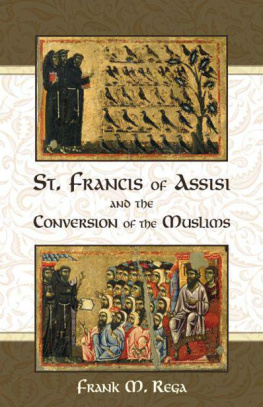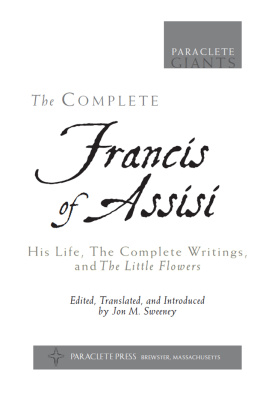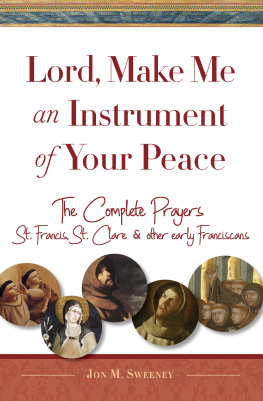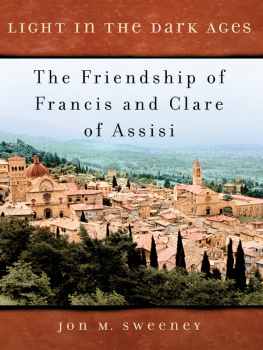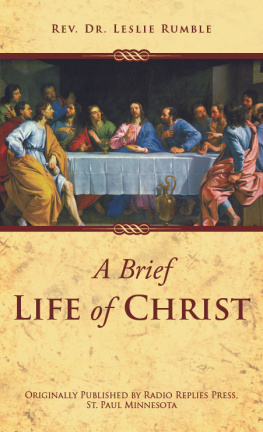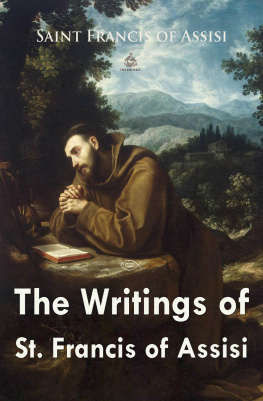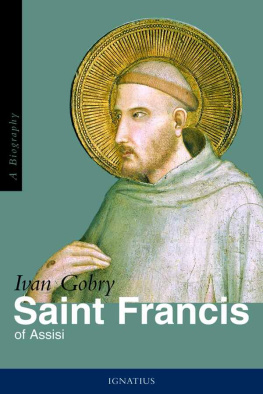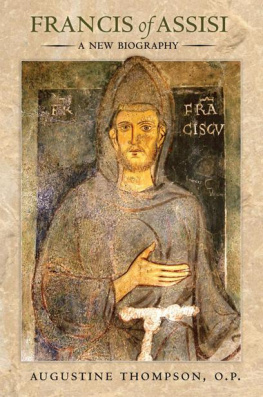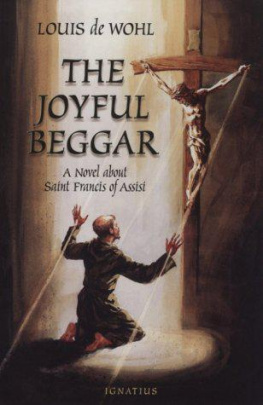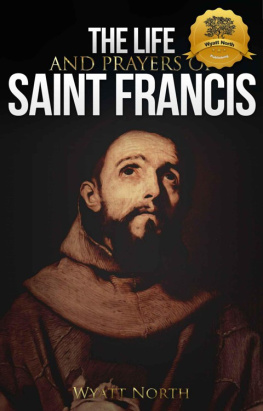To all the admirers and followers of the great Saint of Assisi, who either found Jesus Christ or were drawn closer to Him because of the influence and prayers of St. Francis.
Behold I send you as sheep in the midst of wolves. Be ye therefore wise as serpents and simple as doves. ( Matthew 10:16).
He fought in the Crusade, in which he and he alone emerged the victor.
The Fifth Crusade: All in all, it was a dreary episode, relieved only by the presence of Francis of Assisi, whom Pelagius reluctantly permitted to cross the lines, where he was courteously received by al-Malik al-Kamil.
Acknowledgements
Before mentioning those people to whom I am grateful, it is important to make a preliminary observation, in view of the potentially controversial nature of the topic of this book. My acknowledgement of someones kind assistance and contribution to the research or writing of this book in no way is meant to signify that this person agrees with my viewpoints or conclusion. In other words, any name appearing in the acknowledgements should not be construed as an endorsement of my opinions.
First I would like express my heartfelt appreciation to Fr. Angelus Shaughnessy, O.F.M. Capuchin, who graciously consented to write the Preface for this book.
Special kudos go to Dick and Jan McCarthy, the Minister and Secretary respectively, of my Secular Franciscan family, the St. Clare Fraternity of Bethany Beach, Delaware. Dick and Jan read and commented on each chapter, and their valuable knowledge of St. Francis served them well as critics and inspirations.
A thank you to Brother Alexis Bugnolo, Editor of the Franciscan Archive on the web, for allowing me to use his translations from the Latin of St. Clares Testament and St. Francis Canticle of Brother Sun, and also for his invaluable assistance and advice. Another thank you goes to Professor Emeritus James M. Powell, Syracuse University, for providing a copy of his Italian-language paper and also an unpublished manuscript on St. Francis and the Fifth Crusade. I am also grateful to Jeanette Salerno, novelist and writer, and to her sister Joan, for their invaluable suggestions over the past two years as they shared this journey.
I have used the 1900-page Omnibus as the source for over twenty of the earliest Franciscan books and writings, which are cited in the footnotes as included in the Omnibus . Its full title is St. Francis of Assisi: Writings and Early Biographies, English Omnibus of Sources for the Life of St. Francis, Marion A. Habig, Editor. When a work is taken from the Omnibus, its original chapter and paragraph number are given, if available, so that the citations can be found elsewhere than in the Omnibus .
The Church at the time of St. Francis used the Latin Vulgate Bible, and the Vulgate has been used in this book (The Vulgate contains books from the Greek Septuagint, absent in non-Catholic bibles.) The translation of the Vulgate used here is the Douay-Rheims version. It is available online at: http://www.drbo.org/ and also in print from TAN Books and Publishers, Inc., Rockford, IL 61105, http://www.tanbooks.com.
Finally, when an Internet website is given as a reference, the name of the site is included along with its Internet address. Since web pages sometimes are removed, a search on the name of the site will hopefully turn up a similar reference.
Preface
If anybody in human history ever had the right approach to invite the Muslims to Jesus Christ, it was St. Francis of Assisi. He was a fearless man of God, on fire to share the truth and love of the God-Man to all the world, even to the most difficult assignment that could ever be given to any Christian. St. Francis was wise and prudent, willing to put his life on the line to bring everyone home to the embrace of our Heavenly Father. This most dangerous commission is given only to those who are qualified to be sent, after submitting their inspiration to the Lord in prayer and to their superiors in the Church for approval. Their goal is salvation for themselves and for all those invited to submit to the King of Kings and Lord of Lords.
The author of this volume is qualified to present his thesis for our reflection because his research has been thorough and he has known St. Francis now for many years, as he is a follower and student of the Franciscan way of life in the Secular Franciscan Order. His research is trustworthy and acceptable, without any undue bias in interpreting his original sources.
The subject is timely because the Muslim world in some places has taken a hard line against Christians, in some instances refusing to give them permission to worship in their customary way through the Holy Sacrifice of the Mass. Punishment, incarceration and death are the threats in some Muslim countries for those who would break their laws. When Mother Angelica in 1982 visited Pope John Paul II in Rome and presented him with a baby satellite dish, his only comment to her was: Beware of the Muslims! And there was a certain foreboding to his voice.
The example of St. Francis in confronting the Sultan of Egypt offers the Eternal Word Television Network and the world probably the best way possible to present Christianity to Muslims. St. Francis did not attack Mohammed! He presented Jesus Christ as the Son of the Living God without apology, even though the Moslems did not believe in the Holy Trinity. He did not ridicule any of the tenets of Islam. He established his credibility by truly loving those he was addressing. There is no other accepted entre than this. St. Francis did all of the above, inspired by the Holy Spirit, to the point of working miracles. A Saint can do all that with the help of God. The Sultan recognized that St. Francis was a Saint who loved God very much; and even before that, was also convinced that St. Francis himself was loved by God. St. Francis was full of love for God and for all Gods people, even those who at the present moment do not accept Him as their Saviour.
St. Francis wanted everyone to love the God revealed by Jesus Christ. He would go to the ends of the earth, make the most difficult sacrifices, endanger his own life, if only he would bring one more soul to Heaven. Jesus came into this world to die and to rise, to give His life as a ransom for many. St. Francis would do the same, and he would invite his followers to do likewise. Some Franciscans went among the Saracens and other infidels explicitly for that purpose: to be martyrs for Christ in order to establish their witness before an unbelieving world. This is especially difficult when the ones you are praying for and working for call you infidels for not accepting their idea of God, and they have declared holy war on all infidels!

